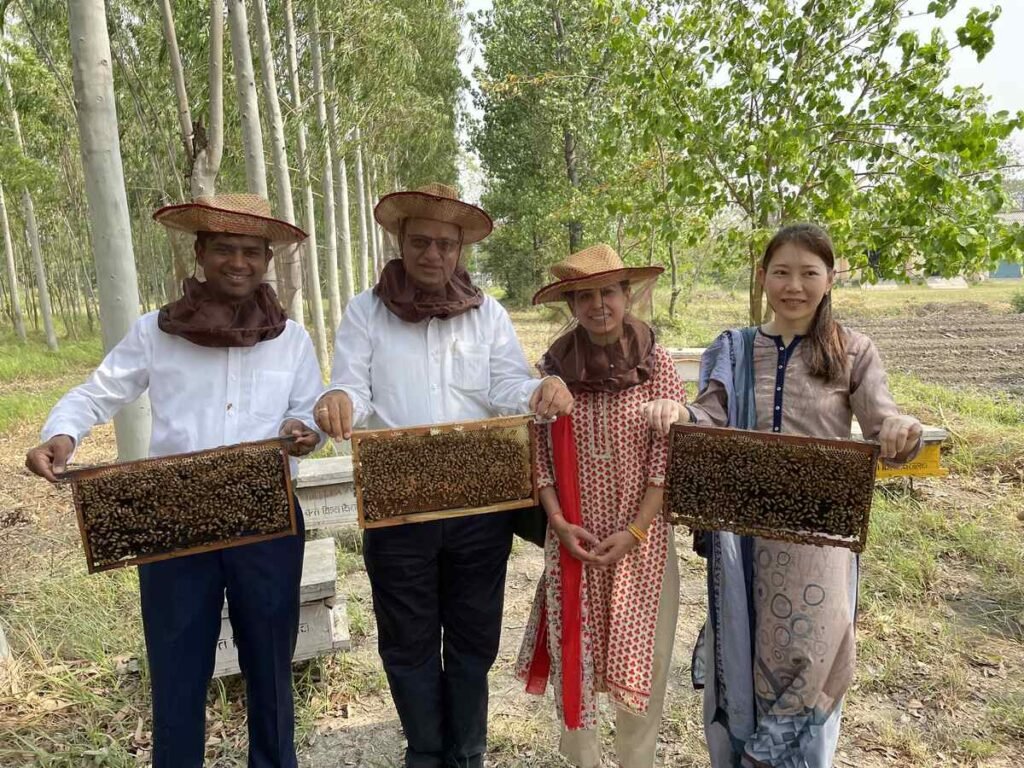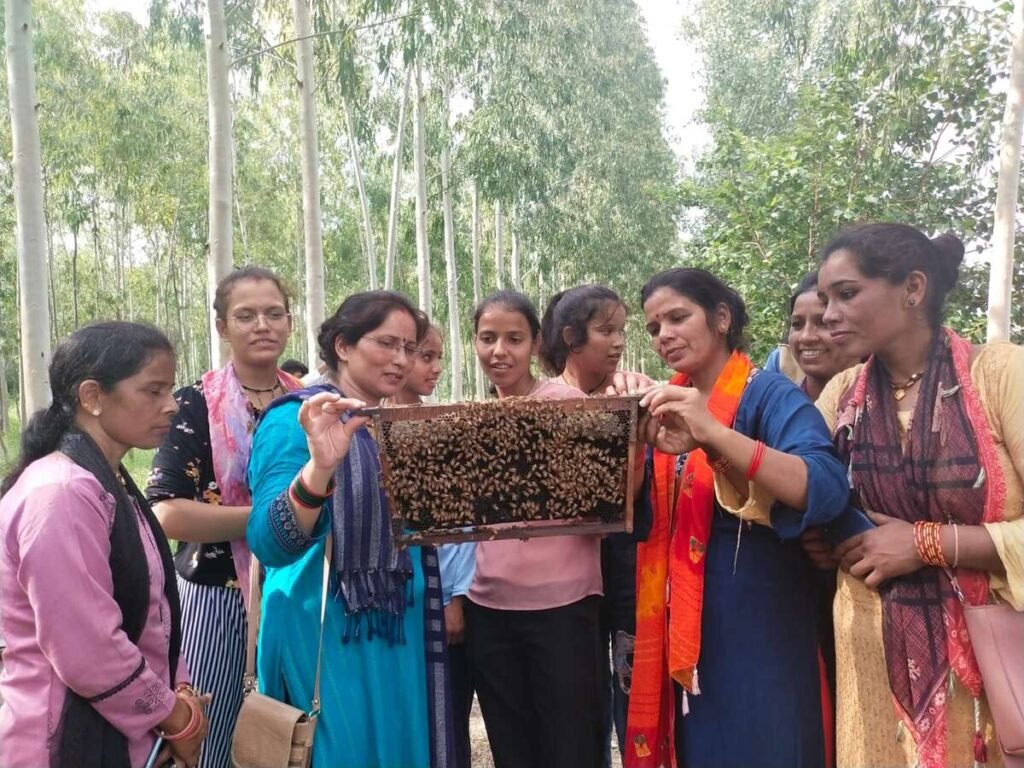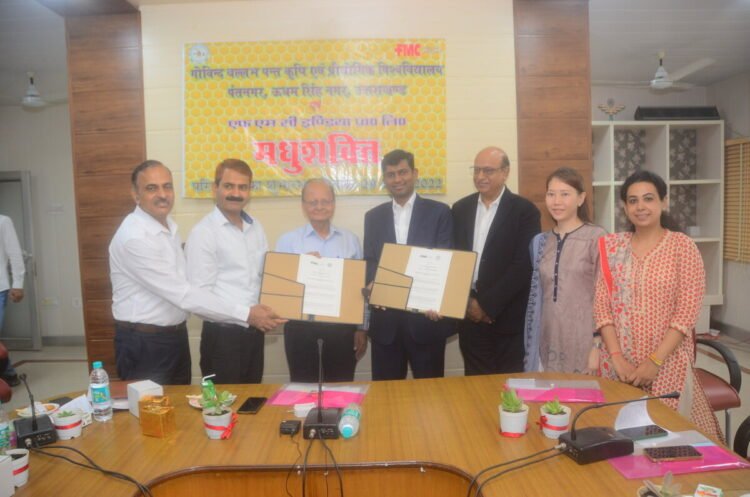“For so work the honeybees, creatures that by a rule in nature, teach the act of order to a peopled kingdom.” Through these words, William Shakespeare uses bees to explain the concept of a perfect society and give a reason as to why God gave humanity different functions.
As India envisioned in COP27 discussions, the nation will make a shift towards driving climate smart agriculture practices for accelerating progress among Indian farming community. Agriculture and food security were major issues needing addressal and action. This led to the establishment of the National Mission for Sustainable Agriculture, which has been a farm friendly policy and delivers cost incentives to promote modernization. Under this policy, the Government has also leveraged digitalization of funds transfer through its Direct Beneficiary Transfer process to ensure smooth pass through of subsidies to end beneficiaries in some states. The challenges to a seamless transaction process currently are lingering timeline uncertainties and non-uniform regional execution.
“Project Madhu Shakti” is a collaborative initiative between G.B. Pant University of Agriculture and Technology (GBPUAT), Pantnagar, Uttarakhand, one of the oldest and most reputed agriculture universities of the country and FMC Corporation, a leading agricultural sciences company. ‘Madhu’ means honey in Hindi while ‘Shakti’ refers to female energy.
The project aims to empower rural women by promoting entrepreneurship among them through beekeeping and honey production. It also seeks to promote good crop protection practices among farmers that protects and enhances pollinator populations while improving productivity. Project Madhu Shakti acknowledges and aligns with the Indian government’s vision to build sustainable agriculture practices, develop farmer resilience, and give women farmers their due credit and share in the occupation of agriculture.

Running since 2022 in Uttarakhand, Project Madhu Shakti is a three-year long project and will help women coming from rural households develop a sustainable source for income generation, become an inspiration for other farmers to become entrepreneurs and educate them on the safe usage of pesticides.
Bringing value by flourishing biodiversity
In a biodiversity rich state like Uttarakhand, beekeeping offers significant potential. The state is reported to have produced only 12,500 metric tons of honey in 2022. To optimize the natural resources available, Government of India’s National Beekeeping and Honey Mission was developed to help the country achieve the goal of “Sweet Revolution” i.e., the need for holistic development of beekeeping. FMC’s sustainability project is addressing it in a scientific manner supported by result-driven analysis. This has been only possible due to the urge of company stakeholders to introduce a collaborative initiative strengthened with the expertise and knowledge of educational institution, professors, agricultural industry bodies, students, bee keeping agents and women farmers.
Honey production is a viable agriculture practice for the foothills of Himalayan mountain range, due to its richness of natural herbs and flora. The project, now in its second-year, targets to train 750 women farmers as beekeepers. More than eight thousand people from around twenty-four villages are expected to directly benefit via increase of up to 30% productivity in various fruits and other crops through good pollination. Beekeeping as a practice can be inculcated easily amongst women farmers with the right kind of training and minimal investment, which makes the project more appealing and impactful.
Process of training farmers in bee keeping
Project Madhu Shakti is utilizing the hives of the Apis Mellifera variety of bees. These hives have been authentically sourced. The better performing colonies are being maintained and multiplied at Honeybee Research and Training Centre (HBRTC), GB Pant University. The stock culture will be monitored, maintained, and multiplied to ensure a consistent supply of beehives for farmers in every season.

So far, seventy-five women master trainers have been given kits, including beehives, upon their return to their villages post-training. Bees have started flocking together towards these beehives. It is known that a single bee colony can pollinate three hundred million flowers a day, the flora in the vast stretches where the hives are feeling the impact of Project Madhu Shakti. The bees have already started producing honey and helping the women beekeepers earn additional income.
Assured buy-back and distinct product identity
The project provides for assured buyback of the honey produced by these women farmers to help them fetch competitive market price for their honey. The aggregation model will build collective strength and traceability while ensuring consistent quality. Upon the quality check of the honey produced, the payment will be released to the beekeepers. The Joint Director of HBRTC will establish and maintain a revolving fund to facilitate payment to farmers and market their products. To fetch a premium price, the product will also be branded, marketed and sold. Hence, the honey brand will be inextricably linked to the women trained under Project Madhu Shakti. The product sold under this brand will also be traceable and enjoy a competitive advantage over unbranded competitors.
An enhanced number of bee colonies will significantly increase the rate of pollination in Uttarakhand. The farmers will start to leverage cross-pollination and its benefits, especially to horticulturalists, horticulture being a major profession in the state. Farmers’ outputs and incomes across the region will increase significantly and the cause of sustainable farming will have a win-win situation for all the stakeholders involved, especially the women farmers and state of Uttarakhand. The Project is building up inbuilt capacity and flexibility, so that the pilot can potentially be repeated at many more locations across Uttarakhand, India and maybe globally.
Abundance of knowledge
Project Madhu Shakti will be a source for plethora of knowledge around safe co-existence of pollinators in and around intensively cultivated agricultural farms. The project will be imparting lessons on judicious and scientific use of pesticides to minimize crop losses. It will also provide an opportunity to curate mechanisms for regulating pesticide usage on commercially important crops without harming benign pollinators including bees.
The trials under Project Madhu Shakti will be conducted in farmers’ fields to deliver them an immersive first-hand experience. All the efforts combined will push this endeavor to go a long way and ensure that the bee population remains out of danger, coupled with socio-economic developments such as better lifestyle for women farmers involved with the project, by providing them financial independence.
Copyright@IndiaCSR























